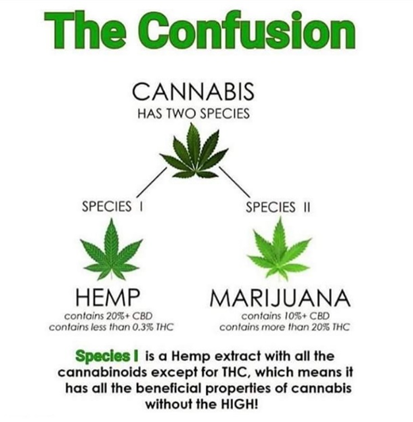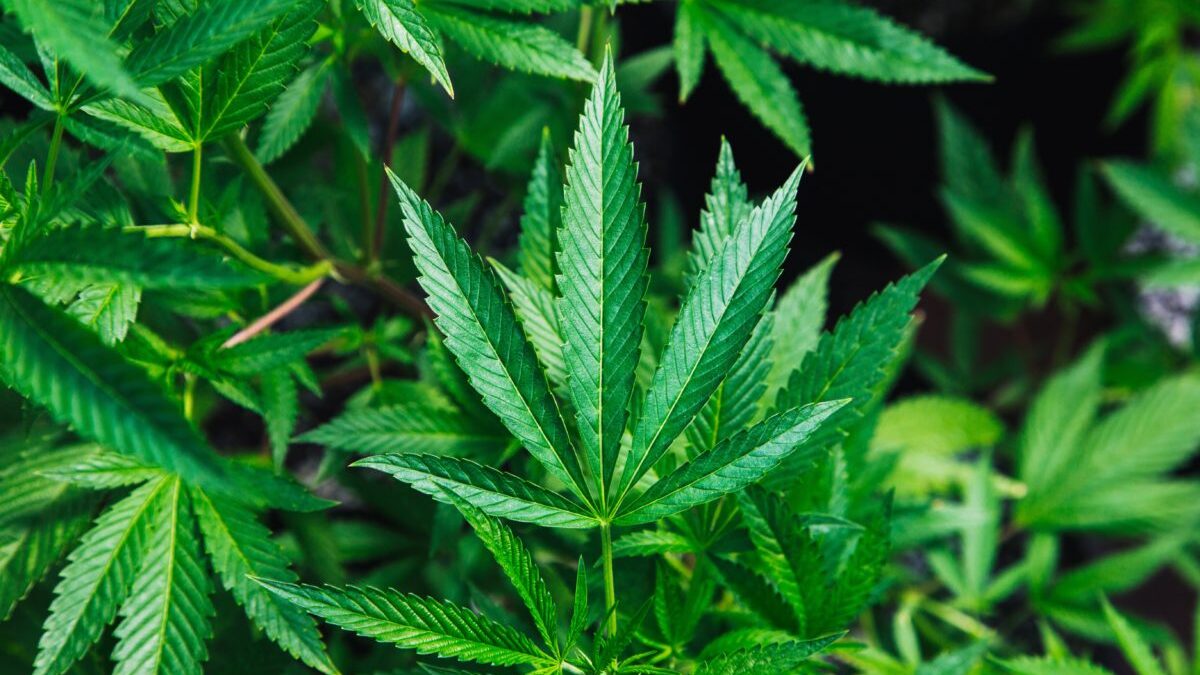I don’t remember ever seeing, hearing and reading, so much about any one ingredient as much as I have with CBD over this past year. It’s everywhere: at the airport, on the checkout counter in your neighborhood drugstore, in fact just about every store that sells health and beauty has some form of a CBD product to hawk. Still, surprisingly, most people don’t fully understand what CBD is or how it works. Cannabidiol (CBD) in mundane terms is a molecule found in the cannabis plant (A.K.A: pot, marijuana, weed, etc.) Though it was discovered in the 1940s, the CBD craze started a few years ago and has recently strengthened after the Senate passed the 2018 farm bill to legalize hemp. The graph below explains the difference between hemp and CBD.

Most CBD products contain very low levels (less than .3%) of THC which is the part of the weed that gets you high. Those low levels enable hemp-derived CBD to be legally purchased and consumed in all 50 states. However, any product above .3% is considered illegal. Yes, that minuscule .1% increase can get you in trouble in most states. To put things into perspective, on average “pot” has 18% THC. CBD has been positioned as a miraculous cure-all capable of treating everything from anxiety to back pain without feeling different, and equally importantly without the red eyes and hysterical laughing.
The CBD industry is still in its infancy and is not even close to reaching saturation. CBD is one of the fastest-growing markets in a generation, with sales projected to reach into the billions. According to a Market Study Report, the Global CBD market size will increase to $38.60 billion by 2025, from $270 million in 2018, at a CAGR of 39.5% during the forecast period.
The beauty industry is at the forefront of this CBD obsession supported by science-based research. There is evidence that CBD oil and its derivatives can treat dry skin, psoriasis, and eczema, which is why the ingredient is popping up in so many face creams, serums, and body lotions. You can also find CBD-based products across the entire beauty and health industry from hair products, soaps, and sleep creams to eye serums that claim to reduce wrinkles, fine lines and plump your skin. Ingested, CBD oil is the new elixir to ease chronic pain, calm nerves and anxiety, and help with so many more ailments in humans and yes for pets too.
The food industry has been more cautious about the CBD craze. There is still confusion in the difference between hemp oil and hemp-derived CBD oil. Many people looking to purchase CBD oil for the potential health promoting effects of this hemp-derived compound accidentally buy hemp oil, which is just another type of cooking oil. The Food and Drug Administration prohibits adding CBD to food and drinks because it is an active ingredient in an FDA-approved drug. However, the tide is changing. In California there has been talks at the state level to pass a bill to legalize CBD foods bypassing the FDA ruling. Selling CBD-infused beauty and skin-care products brings far less legal risk, which explains why supermarkets such as Kroger, are starting to stock these types of products.
The beverage industry is also monitoring the CBD drinks market very closely. In fact, major alcohol beverage companies like Constellation have been very vocal about their interest in investing in CBD products and selling entire wine portfolios to focus their growth on the former. In addition, another well-known player in the space, Phivida Organics, with their new Oki brand of active-hemp, extract-infused flavored waters and iced teas, is targeting health-conscious consumers who are looking for newer ways to enhance their well-being.
While lots of consumers are jumping onto the bandwagon of CBD’s beneficial properties, doctors, pundits and the FDA are warning consumers that there is still a lot research to be done around the health properties, continuous usage or overuse of CBD products. In fact, the FDA has cracked down on dozens of companies selling CBD products online for making health claims. In addition, others argue that without regulation, consumers have no idea if what they’re paying for is pure, potent, or free of toxic substances, or if it even contains the CBD compound.
Here at Padilla, we can bring together our experience in agriculture, health care and food/beverage/nutrition to help build, grow and protect CBD companies. This industry is evolving quickly, and we’re ready to help brands reach consumers eager to learn more about this exciting and controversial product.
For more insights on communication and brand strategy, industry trends and more, subscribe today to the Weekly Buzz here.

